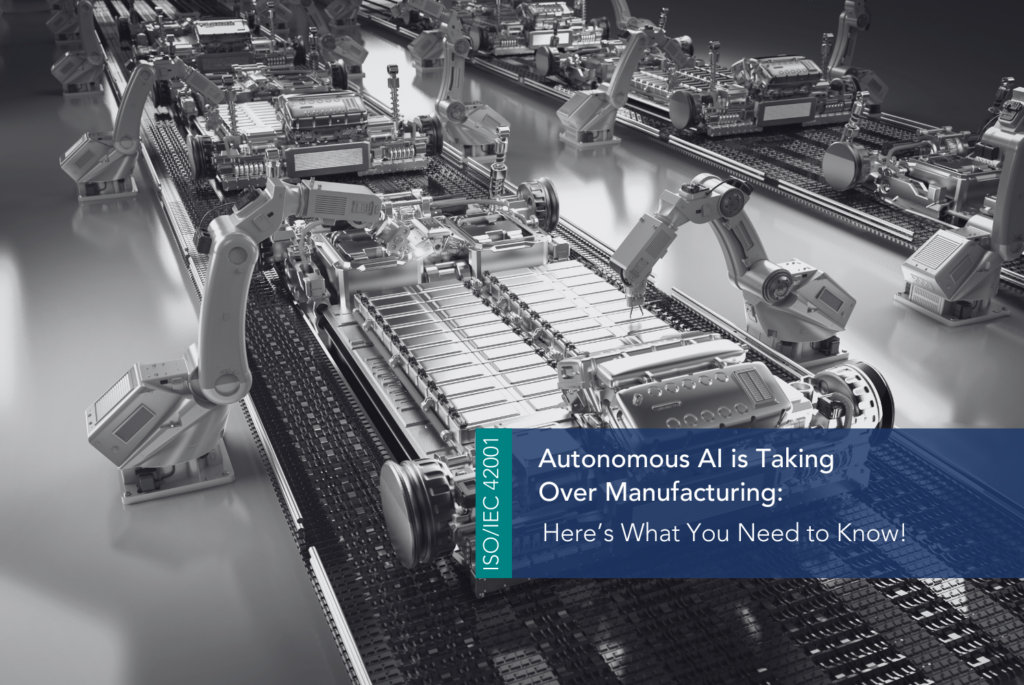
Autonomous AI is taking over Manufacturing
July 19th, 2024 By Amywright5-minute read
The manufacturing industry is undergoing a massive technological shift. Gone are the days of robot and production line-centric innovation; generative and data-driven AI systems are now taking their place.
What springs to mind when you think about innovation in manufacturing? Your first thought is probably of robotic arms or massive conveyor belts. While these technologies are and will always be crucial, they are no longer the driving force behind manufacturing. Instead, the focus has shifted to various front and back-end processes that aim to oversee and streamline the entire production cycle, achieving this by using advanced algorithms to enhance product design, inform predictive maintenance, and optimize supply chains.
AI is taking over manufacturing; here’s what you need to know about it.
Understanding AI in manufacturing
AI has positioned itself at the center of a worldwide technological shift in recent years, and this has proven particularly important for manufacturing, an industry whose pool of innovation has been mostly stagnant for over sixty years. AI has become synonymous with success and automation, worming its way into nearly every sector and every industry. The possibilities here are exceptional for manufacturing, where automation has always been paramount.
The issues
There is a massive disparity between current AI deployment in larger companies, which are more likely to use it, and smaller companies, which barely use it at all. The stats show a striking demonstration of this gap: a respective 77% versus 4%, as found by MIT in partnership with Microsoft. But what exactly is causing this divide?
Expertise and budget
Money, talent, and resources are three things that often dictate any major business decision. Perhaps more so than anything else, these issues are starkly impacting AI’s deployment in manufacturing settings.
A common perception is that an absence of AI-related talent reduces manufacturers’ confidence and limits their understanding of its capabilities. While this is undoubtedly a cause for concern, it isn’t quite the case across the board. Some technologies are more straightforward and affordable to implement than others. If you take the steps to scale and deploy them according to your needs, they can be infinitely valuable.
The data dilemma
AI’s effectiveness in manufacturing depends primarily on its access to high-quality data. If the data is lacking, then the AI-driven solution in question will, too.
Robust data quality standards, alongside integration and governance, are essential in scaling AI systems. A report conducted by MIT in 2024 found that just one-fifth of manufacturers have production assets whose data is ready for use in existing AI models.
The issue’s prevalence also varies depending on the company’s size – the larger the manufacturing firm, the more apparent the problem tends to be. This tends to vary depending on the diversity and scale of AI integration and the resources needed to facilitate the system(s) in use.
Black-box solutions: the concerns
‘Black-box’ systems represent a truly autonomous form of AI and are used extensively in contemporary manufacturing.
While these systems are good at making educated predictions and data-driven decisions, their answer process is often indecipherable to humans, hence the name. Examples of this include LLMs like ChatGPT and Gemini.
The ambiguity surrounding the bits between the input and output is concerning. These technologies pose an inherent risk because we don’t fully understand the background processes; because of this, humans must assume a fact-checking role. To avoid inaccuracies or harmful information, you must incorporate a risk mitigation process, especially in health and safety, engineering, and product design, where preciseness and security are crucial.
How manufacturers can best use AI
Ambitions for AI development are more prominent in manufacturing than in most other sectors due to its array of possible use cases. However, with widespread usage comes the necessity for supervision and accuracy checking.
To best use AI solutions, observe and fact-check the process. How does your system come to its conclusion? What steps does it take to achieve its goal(s)? This is especially important for large language models (LLMs) due to the heightened potential for inaccuracies and false information caused by the non-linear process the model(s) use to generate outputs.
Where does AI fit best within your business? For example, RPA (robotic process automation) might help tackle tedious tasks, freeing up your workforce. Or, you could use a supply chain management system to track sources of defective hardware. These systems tackle problems head-on before they even start. AI could help you brainstorm ideas or inform your product design process – the possibilities are endless.
Taking steps to mandate AI in manufacturing
While AI is currently running amok across all industries, experts anticipate that there will eventually be policies and frameworks dictating AI technologies. ISO/IEC 42001 and ISO/IEC 27001 are frameworks that, when implemented, help you oversee and manage AI and cybersecurity-related risks.
If you’re interested in obtaining ISO certification, look no further. IMSM are ISO experts with over thirty years of experience. We can help you achieve AI compliance long before it becomes an official requirement, keeping you safe and ahead of the curve. Contact us today for a free quotation.

Contact Us
For a free quotation or remote presentation by an ISO specialist, contact us today.
IMSM Ltd Head Office
The Gig House
Oxford Street
Malmesbury
Wiltshire
SN16 9AX